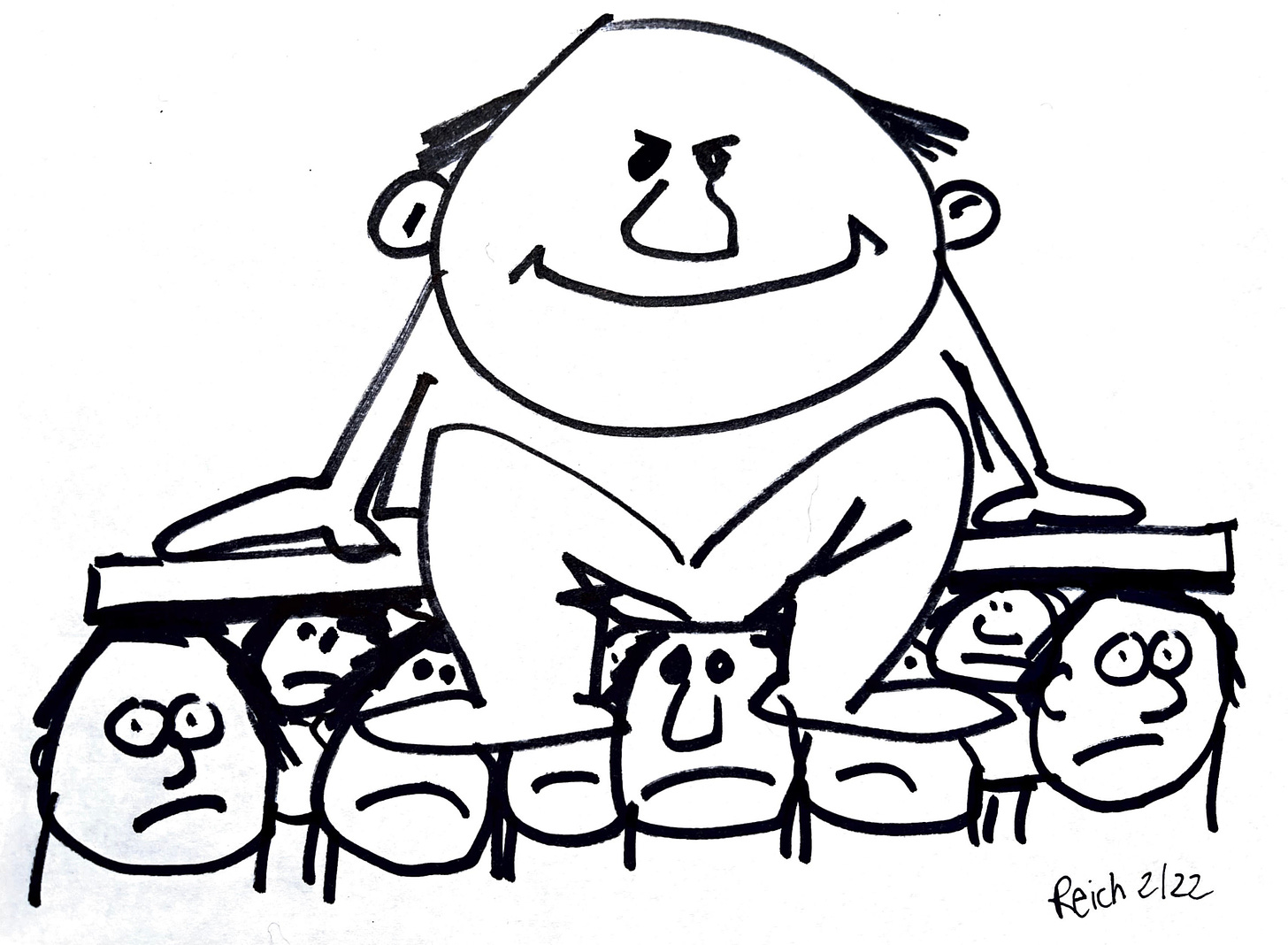Friends,
Okay, the House has passed the debt-ceiling deal, and the Senate will follow suit. So the economic crisis is over. Right?
Not quite, because another and more serious economic crisis is brewing: While the Fed continues to raise interest rates to counter inflation by slowing the economy, big corporations continue to raise prices. Greedflation is stalking the economy.
The latest data shows that the average company in the S&P 500 stock index increased its net profit margin from the end of last year. Wall Street analysts forecast that profit margins will keep expanding in the second half of this year.
The Fed has raised borrowing costs at 10 consecutive meetings, increasing its benchmark rate to over 5 percent. Yet inflation has barely slowed. Why? Because the Fed’s rate hikes barely affect big corporations that continue to raise prices to fatten their profits.
I want to emphasize that it’s their profit margins that continue to increase. Corporations aren’t raising prices to cover increased costs. The Producer Price Index dropped 2.3 percent for the 12 months through April. The prices of oil, transportation, food ingredients, and raw materials continue to drop as the shocks stemming from the pandemic and the war in Ukraine fade. Wage gains still lag behind price increases. Wages and salaries in the Employment Cost Index, a broader measure of worker compensation, have been trending downward for a year.
No, big corporations are raising prices because they can — because they have enough monopoly power to do so. With just a handful of companies dominating each market, it’s easy to implicitly agree they’ll all raise their prices.
They’re not plowing those profits back into investments that would make the economy more productive. They continue to sink them into stock buybacks, which reward executives and big investors but do nothing for the economy.
(By the way, corporate economists argue that businesses couldn’t be padding their profits; if they could, they would have done it before the inflation of the last two years. But businesses have been using the cover of inflation to justify price increases, so consumers accept them. According to Paul Donovan, chief economist at UBS Global Wealth Management, businesses “are confident that they can convince consumers that it isn’t their fault, and it won’t damage their brand.”)
Inflation is not being propelled by an overheated economy. It’s being propelled by overheated profits. So it makes no sense to fight inflation by trying to slow the economy with high interest rates. In fact, this strategy is dangerous — especially now that Congress and the administration are on the verge of reducing anticipated federal spending by about $55 billion next year and another $81 billion in 2025. This one-two punch will take the wind out of the job market but not out of corporate monopolies.
The good news is that even the establishment media is finally catching on. In just the past few weeks, both The Wall Street Journal and The New York Times have featured lead stories highlighting inflation driven in large part by corporations raising their prices to fatten their profits.
This opens space for shifting the burden of fighting inflation from workers and consumers to corporations.
**
As I’ve suggested before, instead of relying on the Fed to “tame” inflation via fewer jobs and lower wages, Democratic lawmakers and the Biden administration should seek legislation that puts more of the onus of fighting inflation on big corporations. Such legislation would:
— Allow the Justice Department to bust up monopolies (and prevent further consolidation through mergers and acquisitions) when three or fewer corporations have more than half the sales of a particular market.
— Direct the Federal Trade Commission to find that any such corporation has engaged in unlawful price gouging whenever it has raised prices higher than the rate of inflation, and impose a fine that would claw back those unlawful gains.
— Permit the Treasury Department to impose a windfall profits tax on large corporations, above a specific reasonable rate of return or profit margin.
If Republicans won’t go along, Biden and the Democrats should make this a major campaign issue for 2024.
They should ask the public: Do you want more jobs and higher wages, or do you want large corporations making fatter profits by raising prices?




Just read an article that went right along with your comments. Essentially it said that the tax cuts of Regan, Bush and now Trump have caused the financial mess this country is in, stating that if we had the Corporate taxes from those 3 cuts back we would not have the debt that is now carried and America would be in decent shape. AND I just read another article that says Republicans are "secretly" planning another tax cut for the wealthy! One of the points was that America's middle and poor class programs and benefits can never be cut enough to slow the accumulating deficit. America has a tax problem, not a debt problem.
I'll give you an example of Robert's greedflation in practice. My son applied for a standard credit card which he felt was necessary for practical and safety reasons. I handed the incoming envelop to him upon it's arrival, he opened it and proudly showed me the shinny piece of plastic that now gave him the power to purchase on demand. This new freedom carried an interest rate of 28% APR. OUCH, and that is an honest way to conduct business, greedflation personified.